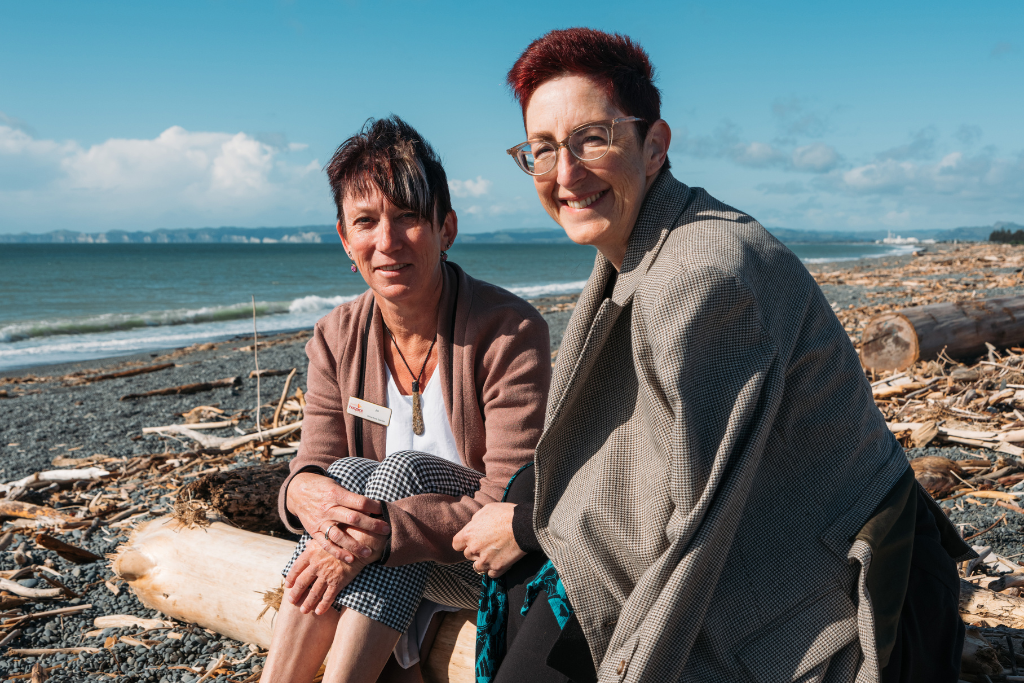What a patient wants, even during a cyclone, is the most important thing.

What a patient wants, even during a cyclone, is the most important thing.
“It was really important to try and do what you could do to make things calm, and to relieve that distress from all the crazy that was going on.”
Sitting down to chat with our nurse Jo and doctor Lynn was a wonderful experience, and one we wanted to share with you.
Both Jo and Lynn live in Napier. They were rostered on to work in our hospice inpatient unit in Hastings the day after Cyclone Gabrielle swept through and caused such devastation to our community. After being turned around at the checkpoints on Marine Parade and Taradale trying to get to work, they met at the Wellesley Road Medical Centre hoping to connect with others.
They arrived in time for a briefing, and quickly established that it was best to set up a Cranford Hospice base at The Doctors on Munroe Street.
“It took us a while to realise that everyone was a bit shellshocked and we probably needed to go out and find patients to let them know we were around still and checking in on them. No one had a phone that was able to ring anywhere. We had to come up with another solution.”
So that’s exactly what they did. With generator power, the team had access to the patient database and a connection to the team in Hastings.
“We worked out who the unstable patients were and looked at where people lived. We had to assume that the ones who had been told to evacuate in really dangerous areas, like Omahu, had evacuated. But we knew that water was through Onekawa where we had patients.
You were either unstable and needing a review anyway, or in an area that was probably flooded. So that made our list of people to visit.”
By this time, more hospice staff arrived. Three doctor and nurse teams were established as part of the Napier response. Community medical bags were pulled together, calling on the Napier Pharmacy, Wellesley Road Medical Centre and Elmwood House to help out with supplies.
“We were very impressed with everyone’s can-do attitude. Everyone was like, here’s a piece of paper, write down what you want. It just showed how we all could come together and work so well as a team.”
With the medical kits ready to go, the team prepared themselves for visiting patients at home.
Lynn laughs as she recalls that “I had put some way too short gumboots in the back of my car that morning, had trousers on that I could roll up, and was wearing some old clothes. We probably didn’t look very professional! We put everything into backpacks and bags so we could carry everything.”
Jo and Lynn then started wading through knee high floodwaters to reach patients who needed them.
“We must have looked a bit peculiar because that’s when we were approached by some neighbours who asked us what we were doing. We explained we were doing health checks, so they offered to help guide us through the streets. The manhole covers were off, and we didn’t know where the pavements were to step up or down so could have easily lost balance and fallen.
It was quite nerve-wracking because we remember seeing a powerline lying in the water. We just thought, well there’s no power in Napier so hope it’s not live!”
One of the patients the team visited had been offered an evacuation, but for very understandable reasons, declined it.
“It was sad because he was in a house surrounded by flood waters. With no power and no radio, he had no way of knowing what was going on in the world. He didn’t have any way to heat food, so was just eating what was in his fridge – which we knew would be going off soon. He was close to dying. It just seemed like the worst set of circumstances.”
But with Jo and Lynn’s help, he was able to get evacuated by helicopter the next day and admitted to our hospice inpatient unit in Hastings to get the full wraparound care he needed.
“It felt really good to get him over to the hospice. We were confident he’d respond really well to that, and he did. I think that it is so special that during a National Disaster, we were able to go to a person’s home and take the time that they needed so that they could get the right support.”
What a patient wants, even during a cyclone, is the most important thing. Our team simply can’t do what we do without beautiful people like you who support us.
Aroha atu, aroha mai, haumie hui e taiki e!
What a patient wants, even during a cyclone, is the most important thing.